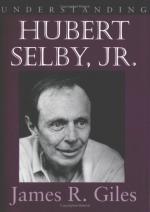|
This section contains 2,402 words (approx. 9 pages at 300 words per page) |

|
SOURCE: "The Stillborn America," in The Nation, New York Vol. 199, No. 18, December 7, 1964, pp. 440-42.
Schott is an American editor and critic. In the following review, he suggests that Last Exit to Brooklyn is a relevant and shocking vision of urban life that nonetheless would have benefited from an exploration of love's presence in the world, not just its absence.
Last Exit to Brooklyn drops like a sledge hammer. Emotionally beaten, one leaves it a different person—slightly changed, educated by pain, as Goethe said. The transfer of suffering has been made. One has gone to bed regretting life, wishing Hubert Selby's stories were not truth, and aware that they cannot be the whole of truth. They both confirm experience—and are caught by limitations imposed by experience.
Selby's world is as hard as a brickbat: greasy all-night diners, darkened bars, garbage-strewn apartments, grinding factories, sinister streets, throbbing motorcycles...
|
This section contains 2,402 words (approx. 9 pages at 300 words per page) |

|


